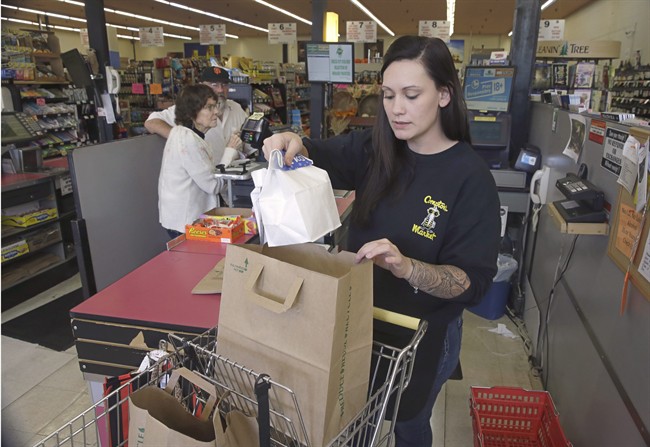New Year, new household budget: The average Canadian family could spend a lot more for everyday items in 2017, thanks to a number of factors.

The doubling of inflation is expected to boost the cost of living this year. Conference Board of Canada chief economist Craig Alexander said in a blog post that inflation could hit two per cent this year, boosting annual expenditures for the average Canadian household by $1,600.
“The pace of inflation won’t pose a threat to the economy, but it does mean that Canadians will be shelling out more money for their purchases,” Alexander writes.
Here’s are some areas where Canadians could feel the pinch in their budgets.
Fuel and energy costs
The price of oil has almost doubled since the beginning of 2016, which has boosted the price of gasoline.
“The higher price for crude will mean that Canadians will spend, on average, 10 per cent more to fill their gas tanks this year than last year,” Alexander writes.
WATCH: Why Canadian gas prices are on the rise

News of an OPEC deal to cut global oil production has sent oil prices on a rally in recent weeks — and that’s before the production cut was even put into place. While a boost in oil prices is good news for Canada’s energy industry, it will push up costs for everyone else.
Rising fuel prices also increase the cost of doing business, as well as the prices of goods and services.
READ MORE: Gas prices are rising: Here’s how it will make living in Canada more expensive
“I think 2017 is probably going to be more expensive than the past two to three years, and not just for gasoline but also for diesel,” gasoline analyst Dan McTeague told Global News last week.
“Things like groceries, things like transportation, public and personal, will be going up.”
Alberta and Ontario also have new carbon pricing adding to fuel and heating costs.
Grocery bills
The cost of imports will increase as the loonie slumps against the U.S. dollar, which will push up the price of many fruits and veggies.
Canada and the U.S. exchanged $2.4 billion in goods and services every day in 2015. While Donald Trump has threatened protectionist measures — including cracking down on free trade agreements such as NAFTA — the extent to which his policies could reach remains to be seen.
READ MORE: Nearly a quarter of Canadians worry about being able to pay for groceries: poll
Canada’s Food Price Report 2017, released last month by Dalhousie University, stated that the average Canadian family will spend $420 more on food in 2017. The hike could leave some families and individuals in the lurch, report author Sylvain Charlebois told Global News.
“So you are going to have to resort to coupons and go out less to restaurants.” he said. “It’s going to be problematic for many, many people.”
WATCH: These are the food items that are expected to rise in price in 2017

Miscellaneous hikes
Prices for all things automotive are set to go up by just over two per cent in 2017, Alexander projects, including cars, trucks and auto parts. Transportation services should also increase in price at a similar pace.
READ MORE: Canadian taxes: Here’s what will be more expensive in 2017
Health care and education costs also typically rise at a faster pace than inflation — this year the costs could rise by 2.5 per cent.
Mortgage rates are likely to increase, set off by a lift to bond yields thanks to the U.S. Federal reserve hiking its rates south of the border.




Comments